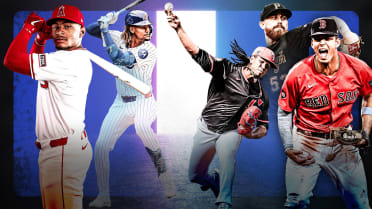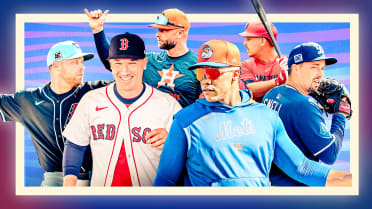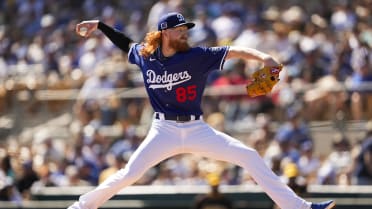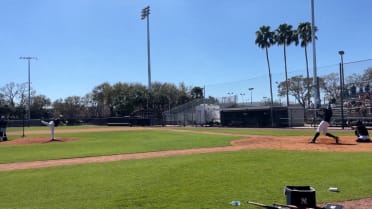Trout should have gone 1 in '09. How about 2?
No player has accomplished more at a younger age than Mike Trout, who has finished no lower than fourth in the American League MVP voting in any of his seven full years in the big leagues -- and he missed a third of the season when he placed fourth in 2017.
Yet as the only player in attendance at MLB Network's studios for the broadcast of the 2009 Draft, Trout had to wait 25 picks to hear his name called. He would reach the Majors barely more than two years later at age 19 and be a full-fledged superstar the next season.
The number of teams that actually considered taking Trout is much smaller than the number of clubs who will claim they did looking back 10 years later. As a whole, the industry underrated exactly how special his bat and speed were. The Tigers (who picked at No. 9), Athletics (No. 13) and D-backs (Nos. 16 and 17) were known to have some interest in front of the Angels at Nos. 24 and 25, but there was a strong possibility that he might not go in the first round at all.
The night before the Draft, word circulated that Trout's asking price was $2.5 million, roughly the same amount as the Commissioner's Office's bonus recommendation for the fifth overall selection. There were no bonus pools in those days, but most teams were loathe to exceed MLB's unofficial slot values. If clubs believed Trout was going to hold firm at $2.5 million, he could have slid past the 32 picks in the first round.
Fortunately for Los Angeles, it had a better read on Trout's talent and signability than perhaps any other club. Its area scout, Greg Morhardt, compared him to Mickey Mantle and had played in the Minors with Mike's father, Jeff. The Angels believed that he valued playing pro ball over breaking the bank and they were proven correct -- he signed 20 days later for $1,215,000, the unofficial recommendation for the No. 25 choice.
The irony of Trout going No. 25 is that the Yankees may have valued Trout more than any other club besides the Angels, and they owned that pick before forfeiting it as compensation for signing free agent Mark Teixeira. Los Angeles had traded Casey Kotchman and prospect Stephen Marek to the Braves for Teixeira in July 2008, only to lose to the Red Sox in the Division Series. New York can't have too many regrets, however, because Teixeira helped deliver a World Series championship in 2009.
If teams could have looked 10 years into the future back then, the Nationals would have grabbed Trout with the No. 1 overall selection. Below is how we see the entire first round playing out with the benefit of 20-20 hindsight. In real life, the Angels scooped up four of our retroactive first-rounders, while the Astros, Brewers, D-backs grabbed three each.
For the purposes of this exercise, we considered only players who signed pro contracts. The best unsigned players from 2009 include Corey Dickerson (29th round, Rockies), Mitch Haniger (31st, Mets), James Paxton (supplemental first, Blue Jays) and Marcus Stroman (18th, Nationals).
1. Nationals: Mike Trout, OF, Millville (N.J.) HS
(Actual pick: Stephen Strasburg, RHP, San Diego State. Trout: first round, No. 25, Angels.)
At the time, Strasburg was the most hyped Draft prospect ever, and he's still the best pitching prospect in Draft history. Since signing a big league contract with a $15,107,104 guarantee that will remain a Draft record for a long time, he has been dominant when healthy but hasn't always been healthy.
2. Mariners: Nolan Arenado, 3B, El Toro HS (Lake Forest, Calif.)
(Actual pick: Dustin Ackley, OF, North Carolina. Arenado: second round, Rockies.)
Scouts liked but didn't love Arenado's bat and wondered about his position, with many projecting him as a catcher. I remember talking to Rockies scouting director Bill Schmidt that fall and he told me, "Arenado is a much better hitter than most people realize." Four All-Star Game selections and four Silver Sluggers later -- not to mention six Gold Gloves -- it's clear that Schmidt was right. Considered perhaps the best college hitter since Robin Ventura, Ackley landed a $7.5 million big league contract and fell off quickly after a strong rookie season in 2011.
3. Padres: Paul Goldschmidt, 1B, Texas State
(Actual pick: Donavan Tate, OF, Cartersville, Ga., HS. Goldschmidt: eighth round, D-backs.)
Goldschmidt led NCAA Division I with 87 RBIs that spring and scouts loved his makeup, but being a righty-hitting first baseman from a mid-major college worked against him. Signed for just $95,000, he proved more athletic than scouts realized and has collected six All-Star Game berths, four Silver Sluggers and three Gold Gloves. Arguably the best athlete in the Draft, Tate turned down a chance to play quarterback at North Carolina to sign for a then high school-record $6.25 million, then topped out in Class A Advanced amid multiple injuries and failed drug tests.
4. Pirates: Stephen Strasburg, RHP, San Diego State
(Actual pick: Tony Sanchez, C, Boston College. Strasburg: first round, No. 1, Nationals.)
None of the options at No. 4 blew Pittsburgh away, so it decided to save money by signing Sanchez for $2.5 million and use the savings to pursue Miguel Sano on the international market. That plan blew up when the Pirates failed to land Sano and Sanchez, whom they compared to Yadier Molina, regressed defensively and never got going offensively.
5. Orioles: Matt Carpenter, 3B, Texas Christian
(Actual pick: Matt Hobgood, RHP, Norco, Calif., HS. Carpenter: 13th round, Cardinals.)
Carpenter was out of shape early in his college career and underwent Tommy John surgery as well, which is why he wound up signing for $1,000 as a fifth-year senior. The three-time All-Star was just one of three late-round finds in 2009 by the Cardinals, who stole Cowley County (Kan.) CC right-hander Trevor Rosenthal in the 21st round and Slippery Rock (Pa.) catcher Matt Adams in the 23rd. Considered more of a mid-first-rounder by most clubs, Hobgood couldn't get past Double-A after signing for a below-slot $2,422,000.
6. Giants: J.D. Martinez, OF, Nova Southeastern
(Actual pick: Zack Wheeler, RHP, East Pauling HS, Dallas, Ga. Martinez: 20th round, Astros.)
Three colleges produced two retro first-rounders: NCAA Division I powers Arizona State and Oklahoma -- and NCAA Division II Nova Southeastern. Besides Martinez and Mike Fiers (22nd round, Brewers, see below), the Sharks had a third big leaguer in Miles Mikolas (seventh round, Padres), who will warrant inclusion on future versions of this list if he can build on his strong 2018. Martinez batted .428 with 15 homers as a junior but landed only a $30,000 bonus in the 20th round, and the Astros released him in 2014 right before a remade swing transformed into one of the game's most dangerous hitters. Wheeler has shown why he went sixth overall when he hasn't been battling injuries.
7. Braves: Kyle Seager, 2B, North Carolina
(Actual pick: Mike Minor, LHP, Vanderbilt. Seager: third round, Mariners.)
No one saw Seager eclipsing Ackley while they played next to each other in North Carolina's infield, but he blossomed into an All-Star and Gold Glover at third base. Minor reached the Majors in 2010 and had what looked like a breakthrough year in 2013, but his career appeared in jeopardy when he hurt his shoulder the next season. He made it back as a Royals reliever in 2017, however, and has been one of baseball's best starters the last two years with the Rangers.
8. Reds: Brandon Belt, 1B, Texas
(Actual pick: Mike Leake, RHP, Arizona State. Belt: fifth round, Giants.)
Drafted as a left-handed pitcher out of high school and junior college, Belt showed modest power with the Longhorns but started driving the ball after the Giants got him to stop closing off his stance and start using his legs more in his swing. Leake went straight to Cincinnati without spending a day in the Minors and has had a steady if unspectacular career as a middle-of-the-rotation starter.
9. Tigers: Patrick Corbin, LHP, Chipola (Fla.) JC
(Actual pick: Jacob Turner, RHP, Westminster Christian Academy, St. Louis. Corbin: second round, Angels.)
One of Tom Kotchman's many great scouting finds for the Angels, Corbin began his college career as a baseball and basketball player at Mohawk Valley (N.Y.) CC before becoming Florida's top juco pitcher in 2009. In a Draft with several highly touted prep pitching prospects (most of whom didn't pan out), Turner landed the biggest payday with a $5.5 million big league contract. He advanced to Detroit at age 20 but has just a 14-31, 5.37 record in parts of seven years in the Majors.
10. Nationals: Brian Dozier, SS, Southern Mississippi
(Actual pick: Drew Storen, RHP, Stanford. Dozier: eighth round, Twins.)
A senior signed for $30,000, Dozier missed the bulk of Southern Mississippi's surprise run to the College World Series with a broken collarbone. He went from being projected as a utility man to slamming 42 homers in 2016. Storen debuted in Washington 11 months after getting drafted and saved 43 games in 2011, though he may be best remembered for surrendering four runs in the ninth inning to blow the decisive game of a 2012 Division Series against the Cardinals.
11. Rockies: Dallas Keuchel, LHP, Arkansas
(Actual pick: Tyler Matzek, Capistrano Valley HS, Mission Viejo, Calif. Keuchel: seventh round, Astros.)
Seen as a finesse lefty who might have a role as an innings-eater and never rated as a top prospect in the Minors, Keuchel never lit up radar guns but won a Cy Young Award in 2015 and a World Series in 2017. Matzek rated as high as No. 2 on some clubs' Draft boards, slipped to No. 11 amid talk he wanted "unprecedented money" and signed for $3.9 million. He battled his mechanics throughout his career and pitched only briefly in Colorado.
12. Royals: DJ LeMahieu, 2B, Louisiana State
(Actual pick: Aaron Crow, RHP, Fort Worth/American Association. LeMahieu: second round, Cubs.)
LeMahieu played a key role in Louisiana State's 2009 College World Series championship but had a somewhat limited ceiling as an opposite-field hitter without much power. His career took off after he went to the Rockies in one of Theo Epstein's first trades as Cubs president, as he won a batting title (.348) in 2016 with the help of Coors Field and eclipsed all defensive expectations by winning three Gold Gloves. The top right-hander in the 2008 Draft, Crow went ninth to the overall Nationals but failed to sign when the two sides couldn't close a gap between $3.5 million and $4 million. After spending time in the independent American Association, he went in the first round for the second straight year and came to terms this time for a $3 million big league contract. An All-Star as a rookie in 2011, he blew out his elbow before the 2015 season and never pitched in the Majors again.
13. Athletics: Jason Kipnis, OF, Arizona State
(Actual pick: Grant Green, SS, Southern California. Kipnis: second round, Indians.)
Kipnis redshirted in his first year at Kentucky and got suspended in his second, then transferred to Arizona State and turned down the Padres as a fourth-rounder in 2008. Some clubs profiled him as a tweener outfielder because of a lack of power and speed, but he handled second base and discovered more pop than expected. Though Green got Evan Longoria comps and a well over-slot $2.75 million, he never made it as a big league regular.
14. Rangers: A.J. Pollock, OF, Notre Dame
(Actual pick: Matt Purke, LHP, Klein, Texas, HS. Pollock: first round, No. 17, D-backs.)
Pollock put himself on the prospect map by winning Cape Cod League MVP honors in 2008 and has lived up to his scouting, starring in his one completely healthy big league season in 2015. Purke had a handshake agreement for a $6 million bonus with the Rangers, but MLB was fronting the team payroll money and made it back out of the deal. He went to Texas Christian, where he starred as a freshman and got hurt as a sophomore, when he signed a big league contract for $4.15 million as a Nationals third-rounder. He got to the Majors briefly but never won a game there.
15. Indians: Mike Minor, LHP, Vanderbilt
(Actual pick: Alex White, RHP, North Carolina. Minor: first round, No. 7, Braves.)
White appeared on his way to a promising career with the Indians when they dealt him to the Rockies as part of a package for Ubaldo Jimenez. He never figured out how to succeed in Coors Field, got traded to the Astros and never was the same after Tommy John surgery in 2013.
16. D-backs: Mike Leake, RHP, Arizona State
(Actual pick: Bobby Borchering, 3B, Bishop Verot HS, Fort Myers, Fla. Leake: first round, No. 8, Reds.)
Everyone knew the D-backs loved Borchering, who inspired Chipper Jones comparisons that proved horribly optimistic as he never climbed past Double-A.
17. D-backs: Scooter Gennett, SS, Sarasota (Fla.) HS.
(Actual pick: Pollock. Gennett: 16th round, Brewers.)
Note that the D-backs are the first team to get a better player in real life than they did in our do-over. Gennett was a bat-first middle infielder who slid because of a perceived strong commitment to Florida State, yet he signed for $260,000. He hit for average and earned All-Star honors almost everywhere he went, and his power surged after the Reds claimed him on waivers in March 2017.
18. Marlins: Khris Davis, OF, Cal State Fullerton
(Actual pick: Chad James, LHP, Yukon, Okla., HS. Davis: seventh round, Brewers.)
Though he was regarded as a one-tool player, that tool (power) got Davis to the big leagues and allowed him to lead the Majors with 48 homers last season. Plagued by mechanical and conditioning issues, James never got past Double-A.
19. Cardinals: Wil Myers, C, Wesleyan Christian Academy, High Point, N.C.
(Actual pick: Shelby Miller, RHP, Brownwood, Texas, HS. Myers: third round, Royals.)
The Royals considered Myers at No. 12 but were able to grab him in the third round because he scared clubs off with a $2 million price tag. Though he has been a Rookie of the Year and an All-Star, he'll be known best as the key to a 2012 trade that brought Wade Davis, James Shields and a 2015 World Series title to Kansas City. Signed for a well over-slot $2,875,000, Miller had three straight strong seasons as a big league starter before the Braves sent him to the D-backs in a much-panned trade for Dansby Swanson and Ender Inciarte, after which he hasn't been able to stay healthy.
20. Blue Jays: Kike Hernandez, SS, American Military Academy, Guaynabo, P.R.
(Actual pick: Chad Jenkins, RHP, Kennesaw State. Hernandez: sixth round, Astros.)
Kudos to the Astros for seeing something in Hernandez, who didn't have any obvious standout tools but has become a tough out capable of playing all over the diamond. Billed as Joe Blanton with better command, Jenkins threw 41 consecutive scoreless innings that spring in college but would win just three games in the Majors.
21. Astros: Zack Wheeler, RHP, East Pauling HS, Dallas, Ga.
(Actual pick: Jio Mier, SS, Bonita HS, La Verne, Calif. Wheeler: first round, No. 6, Mets.)
While the Astros scored in the sixth (Hernandez), seventh (Keuchel) and 20th (Martinez) rounds, they struck out in the first. He never hit after a strong debut and peaked in Triple-A.
22. Twins: Yan Gomes, C, Barry University
(Actual pick: Kyle Gibson, RHP, Missouri. Gomes: 10th round, Blue Jays.)
Gomes spent two years at Tennessee before transferring to NCAA Division II Barry, where he showed solid raw power and defensive skills. Those played better in pro ball than expected, as he became the first Brazilian to reach the Majors and carved out a career as an underrated regular. Gibson was expected to go near the top of the Draft before he got hurt in his final college start and was diagnosed with a stress fracture in his right forearm. He still received an above-slot $1.85 million bonus and developed into a steady presence in the Twins' rotation for the last six years.
23. White Sox: Jake Marisnick, OF, Poly HS, Riverside, Calif.
(Actual pick: Jared Mitchell, OF, Louisiana State. Marisnick: third round, Blue Jays.)
The Blue Jays couldn't sign supplemental first-rounder Paxton, second-rounder Jake Eliopoulos or third-rounder Jake Barrett, but they did get Marisnick done in the third round for $1 million. Scouts loved his speed and defense but questioned his bat then, and they still do now. Mitchell won baseball and football national championships at Louisiana State, and his upside reminded some evaluators of Carl Crawford. But he tore up his left ankle making a spectacular catch during his first Spring Training in 2010 and was never the same, topping out in Triple-A.
24. Angels: Randal Grichuk, OF, Lamar Consolidated HS, Rosenberg, Texas.
(Actual pick: Grichuk.)
This selection matches up perfectly, though it must be noted the Angels rated Trout higher than Grichuk but reversed the order of the picks in part because of Trout's asking price. Grichuk's ticket was and remains his power -- first evident when he starred at the 2004 Little League World Series -- and he has turned out to be a better athlete and defender than anticipated.
25. Angels: Kyle Gibson, RHP, Missouri
(Actual pick: Mike Trout, OF, Millville, N.J., HS. Gibson: first round, No. 22, Twins.)
Angels GM Tony Reagins fired scouting director Eddie Bane 15 months after his 2009 Draft included Trout, Corbin, Grichuk, Garrett Richards (supplemental first round, see below) and two more big leaguers in Tyler Skaggs (supplemental first round) and David Carpenter (ninth round). Bane also grabbed Kole Calhoun in the eighth round in 2010. In a not unrelated development, Los Angeles' farm system nosedived a few years later.
26. Brewers: Chase Anderson, RHP, Oklahoma
(Actual pick: Eric Arnett, RHP, Indiana. Anderson: ninth round, D-backs.)
A changeup specialist in college, Anderson picked up velocity in pro ball and has held down a big league rotation spot for the last six seasons. Arnett starred on the mound while also dabbling in basketball at Indiana, but his stuff regressed almost immediately after he signed.
27. Mariners: Mike Fiers, RHP, Nova Southeastern
(Actual pick: Nick Franklin, SS, Lake Brantley HS, Altamonte Springs, Fla. Fiers: 22nd round, Brewers.)
The lowest real-life pick (22nd round) on this list, beating out his college teammate Martinez, he also might have been the oldest player in the 2009 Draft at nearly 24 years of age. Then and now, he relied on mixing four pitches and deception to keep hitters off-balance, and he's a dependable innings-eater with two no-hitters to his credit. Other late-rounders who didn't quite make our redraft: A.J. Ramos (21st round, Marlins), Rosenthal (21st round, Cardinals), Adams (23rd round, Cardinals), Dan Straily (24th round, Athletics) and Justin Bour (25th round, Cubs). As for Franklin, he mirrored fellow Mariners first-rounder Ackley by impressing scouts with his pure hitting ability as an amateur but proving unable to translate it to the Majors.
28. Red Sox: Steven Matz, LHP, Melville HS, East Setauket, N.Y.
(Actual pick: Rey Fuentes, OF, Callejo HS, Manati, P.R. Matz: second round, Mets.)
The Mets paid Matz, the top pitching prospect in the Northeast, a well over-slot $895,000 in the second round but didn't get him on the mound until 2012 because he had Tommy John surgery and a longer-than-usual comeback. He's formidable when fully healthy, which hasn't often been the case. The Red Sox thought Fuentes could become similar to Johnny Damon or Jacoby Ellsbury, but there just wasn't enough impact in his bat.
29. Yankees: Billy Hamilton, OF, Taylorsville (Miss.) HS.
(Actual pick: Slade Heathcott, OF, Texas HS, Texarkana, Texas. Hamilton: second round, Reds.)
Hamilton elicited Cool Papa Bell comparisons (!) and was a Mississippi State wide receiver recruit. He has provided plenty of value with his speed and center-field defense but has been a liability at the plate. Also a quality athlete, Heathcott commanded a $2.2 million bonus but never could shake shoulder and knee injuries that began in high school. He got just 25 at-bats in the big leagues yet homered off All-Stars Brad Boxberger and Greg Holland.
30. Rays: Mychal Givens, SS, Plant HS, Tampa, Fla.
(Actual pick: Levon Washington, 2B, Buchholz HS, Gainesville, Fla. Givens: second round, Orioles.)
A legitimate two-way prospect, Givens spent three years in the Minors at shortstop before moving to the mound in 2013. He's having a rough 2019 after four strong years of relief for the downtrodden Orioles. Washington had top-of-the-scale speed and bottom-of-the-scale arm strength following a shoulder injury, and he and the Rays couldn't agree to terms. The Indians paid him $1.2 million as second-rounder out of Chipola (Fla.) JC in 2010 but he couldn't hit his way past Class A Advanced.
31. Cubs: Tucker Barnhart, C, Brownsburg (Ind.) HS.
(Actual pick: Brett Jackson, OF, California. Barnhart: 10th round, Reds.)
Scouts liked Barnhart's athleticism for a catcher but worried about his size and commitment to Georgia Tech, so that's why he dropped to the 10th round before signing for $250,000. He won a Gold Glove in 2017 and provides some intermittent power. Jackson was tooled up but swing-and-miss issues ate him up as he climbed the latter, as he posted a 33 percent strikeout rate in Triple-A and a 41 percent mark during his brief time in the Majors.
32. Angels: Garrett Richards, RHP, Oklahoma
(Actual pick: Tim Wheeler, OF, Sacramento State. Richards: supplemental first round, Angels.)
Richards had loud stuff but also a 6.57 ERA in three years at Oklahoma, and to the Angels' credit they straightened him out quickly. He had a nice three-year run in Los Angeles from 2013-15 but repeated injuries have limited him to 28 starts since. Wheeler (no relation to Zack) slammed 33 homers in Double-A in 2011 before his power disappeared while he spent four years in Triple-A without getting to Colorado.
Jim Callis is a reporter for MLB.com. Follow him @jimcallisMLB and @jimcallis.bsky.social. Listen to him on the weekly MLB Pipeline Podcast.




